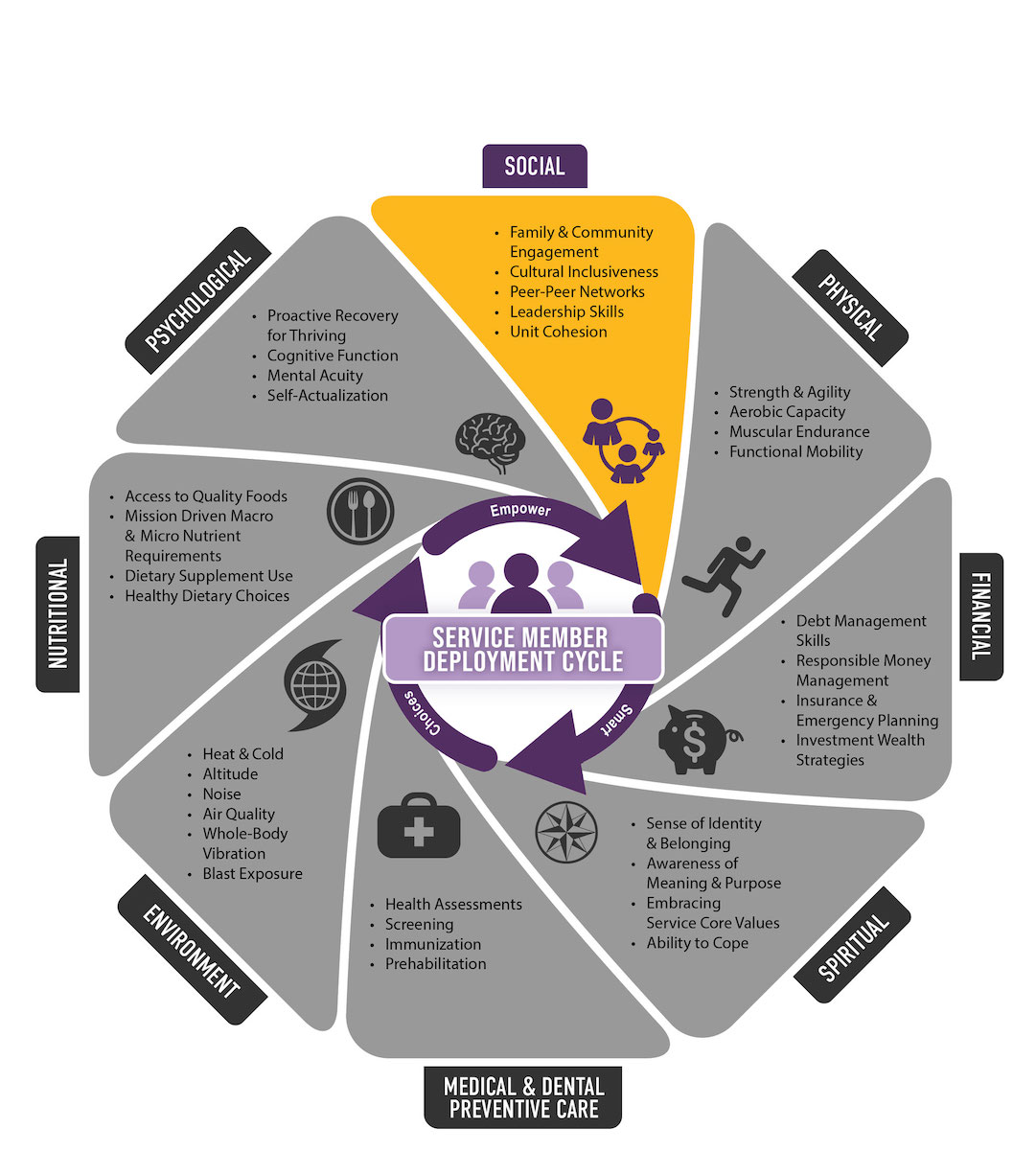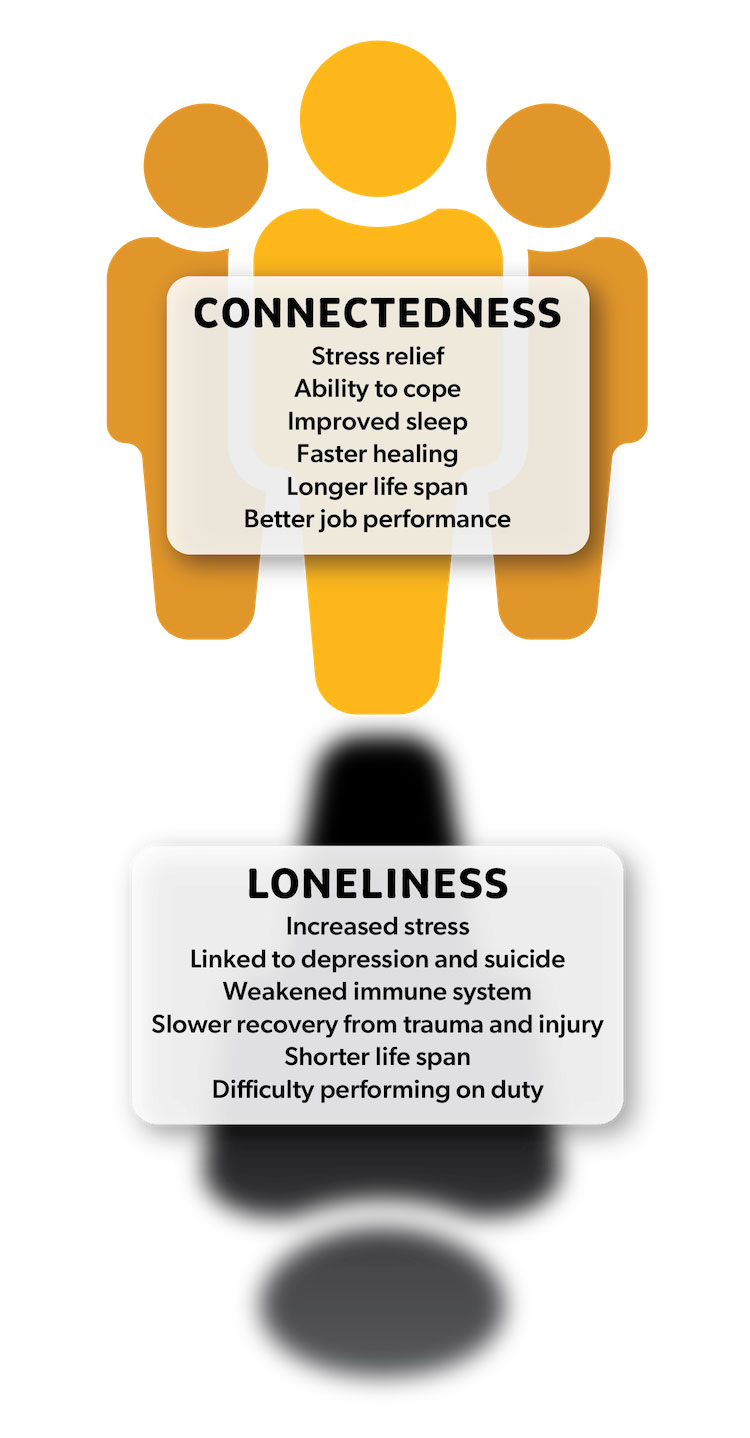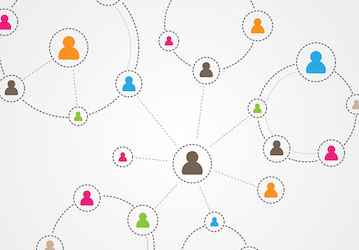Social fitness is the degree to which you assess, build, and optimize the relationships and interactions you have with others. The connections you build with family members, friends, teammates, and those in your community are key to your overall health and your ability to perform (and be) at your best. Healthy relationships are characterized by mutual respect, support, and effective communication. The health of your relationships and your level of engagement in those relationships impact all other aspects of your well-being—from how much sleep you get, to the food choices you make, to how you recover from illness, stress, and trauma. Whether you’re a Service Member, military spouse or partner, parent, friend, or other support, building healthy relationships and growing your interpersonal skills can help keep you and the force strong.
 Social fitness and your health
Social fitness and your health
A domain within the Total Force Fitness framework of holistic health, social fitness is a key component of achieving (or working towards) human performance optimization. Your level of social fitness can impact many other areas of your well-being, including your physical and mental health and even your ability to complete your job tasks while on duty.
Those who benefit from good friendships, have strong family relationships, and are connected to others on duty and in their community tend to be physically healthier than those without meaningful social ties. They’re likely to have better cardiovascular health, lower blood pressure, and less inflammation as well. They also tend to recover from illness and injury more quickly and live longer. Strong relationships matter for your health, just as much as losing weight, getting active, sleeping well, and stopping smoking. The reverse is also true: People who experience loneliness or don’t feel supported by those around them report more health problems. Those with weak relationships are also at risk for earlier death.
 Strong bonds and healthy relationships improve your mental fitness too. People who feel connected to others and invested in their relationships are often able to cope with stress better. Social connections can also help buffer the effects of depression, anxiety, and even thoughts of suicide. Meanwhile, people without close relationships, or those who have high conflict or unhealthy relationships, might actually experience those relationships as stressors themselves. Relationship stress might cause you to turn to unhealthy habits—such as drinking, drug use, isolation, or overeating—to cope.
Strong bonds and healthy relationships improve your mental fitness too. People who feel connected to others and invested in their relationships are often able to cope with stress better. Social connections can also help buffer the effects of depression, anxiety, and even thoughts of suicide. Meanwhile, people without close relationships, or those who have high conflict or unhealthy relationships, might actually experience those relationships as stressors themselves. Relationship stress might cause you to turn to unhealthy habits—such as drinking, drug use, isolation, or overeating—to cope.
Why is there such a strong connection between health and relationships? It sounds simple, but the others influence what you do and how you feel.
- Behavior. When you have people in your life who you care about and who care about you, it’s often easier to make choices that keep you healthy. It might be because you feel a responsibility to stay healthy for others (like your children), or because they encourage you to make good choices (for example, a spouse reminding you to take your medication). And sometimes it’s simple social pressures and keeping up with social norms that keep you on track (for instance, not wanting to be the only teammate to fail your PT test).
- Purpose. The relationships with the people in your life probably help give you a sense of meaning and purpose. Connecting with others can help you feel that you matter which can help you feel happier, have more gratitude, and be more optimistic. And having good relationships with those you regularly interact with can help you feel more in control of your environment, which reduces stress and helps you feel more motivated.
While positive influences and caring people can positively affect your behaviors and build emotional fulfilment, negative influences can hurt your health. If you’re surrounded by those who don’t encourage healthy behaviors, have an interest in your health (or their own), or inspire purpose (or are unpredictable), your well-being and the choices you make can suffer. That’s why it’s important to build your social relationships and be thoughtful about who surrounds you.
Assess your social fitness
Although the impact of social health is similar to other aspects of health such as physical fitness or nutrition, it’s not so easy to measure what makes a Service Member, team, unit, or family socially fit—or to pinpoint what the ideal social support network looks like. The reality is that all relationships are different and how they impact overall health and performance will look different for everyone. In order to assess your own social fitness and whether your relationships are working for you, start by thinking about the different types of relationships in your life.
- Consider the number of different relationships and regular interpersonal interactions you have, and the frequency with which you have them. From your partner, roommate, or team members who you see every day, to those battle buddies, friends, neighbors, or colleagues who you check in with a few times a week, month, or year—all of your connections matter.
- Ask yourself about the interconnectedness of your social circles. For example, do most of your friends know each other, work together, or spend time together? Do most of your friends or loved ones also attend your place of worship or live nearby?
- Think about closeness and quality. Who can you lean on, and who leans on you (and for what)? Which relationships flow with little conflict and easy communication? Which ones are tougher?
- Finally ask yourself how others support you, and you support them. There are people who offer emotional support and are good listeners. Then there are those who always give good advice, are in the know, or can point you in the right direction. And then there are people who help you get stuff done in the real world—whether it’s picking up your mail while you’re TDY, loaning you money when you’re in a tight spot, or packing boxes for your PCS. And then there are those you identify with: the people you relate to and make you feel like you belong.
Social fitness is about understanding and nurturing all of your different relationships because it takes all types to have a well-rounded social support system that will help you be at your best. Take an inventory of all of your relationships and consider where improvements can be made. Are you putting in the effort needed to keep these ties strong? Doing so will not only enhance your connections to those around you, it also has the potential to add years to your life.
Where to focus: Social fitness and performance resources
All of your relationships matter. The benefits of a healthy relationship (or negative impacts of an unhealthy one) in one area of life spill over into other areas. Whether at home, in your personal life, or when engaging with your team on duty, consider how you can optimize your social fitness.
- Family, couples, and friends. Positive and supportive personal relationships at home help Service Members stay focused and have the emotional energy needed to perform job duties. Building strong relationships at home takes work. With family members and friends, focus on positive and productive interactions, optimizing resilience, and parenting with compassion. With your partner, build closeness and intimacy and keep communication open, honest, and respectful.
- Teams and leadership. Strong relationships with your team members help you do your job better, stay engaged, and communicate mission tasks clearly and effectively. Focus on building team cohesion, trust, and interpersonal leadership skills.
